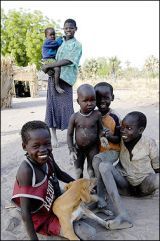Southern Sudanese want peace deal to bring prosperity
RUMBEK, Sudan, Jan 14 (AFP) — Life has been hard for Teresa Samuel since her husband died during a gun battle with Sudanese government troops in 1994 in Kapoeta, a small garrison town on the Sudanese-Kenyan border.

|
|
A group are Sudenese children play outside their makeshift hut on the outskirts of the southern Sudan provisions town of Rumbek. (AFP). |
She sobbed as she explained how she managed to raise their eight children on her own as the war escalated in the years that followed her husband’s death, grappling with diseases and struggling against odds to fight off hunger.
“I did not get support from anybody,” said Samuel, in her 40s.
The town hosts an estimated 30,000 people, the majority of them impoverished villagers, who have suffered the brunt of war for more than two decades.
A glimmer of hope?
But the signing of a peace agreement between the Sudanese government and the rebel Sudan People’s Liberation Movement (SPLM) on Sunday in Kenya has brought a glimmer of hope to Samuel and the people of Rumbek.
“I am happy,” she said, surveying the restaurant, a small structure built from wood and grass.
The place, one of many in the area, belongs to her and she spends long hours here, preparing and serving soup in order to generate income for the family.
A woman throws wood into the fire, sending plumes of smoke rising through the roof. A patron in the room coughs, but does not complain. He waits patiently for the soup to be served.
They have been patient for many years, praying and hoping that each new day would bring closer the day when peace will finally come to their country and, with it, development and prosperity.
However, the failure by successive regimes in Khartoum to honour agreements signed with the southerners has inspired many to view the latest deal with cautious optimism, if not suspicion.
“I hope that this peace is real,” said Ruei Kulang, 31, of Yirol, in Bahr Ghazel, one of three main regions in southern Sudan.
“Our leaders should be vigilant or they will be fooled again,” warned Martin Madual, a resident of Rumbek and former SPLM fighter. He lost a leg in the war and said he hates to think that he fought in vain.
They all want the agreement to be honoured and backed up by actions on the ground that would have an immediate and positive impact on their lives.
“I want to see some development here,” said Jackson Daoud, 58, a trader and father of 21 children from six wives. Daoud hails from Yei, on the southernmost tip of Sudan, close to the border with Uganda.
Before the war, he used to run a successful business in Yei, which collapsed overnight in the confusion that followed days of fighting between government forces and SPLM fighters.
Now he sells paraffin for a living and moves around bare-footed. His clothes need washing, but access to water continues to be a major problem in most parts of southern Sudan.
To reconstruct and revive!
Daoud said he hopes that he would be able to reconstruct his life and revive his business now that a peace agreement has been signed.
“I want to see my children. I want to have the means to take care of them and educate them,” he prayed. Not many of his children are with him.
Some fled to the Democratic Republic of Congo, others to Uganda and others headed to Juba, the principle city in the south, and then proceeded north to Khartoum. “They all scattered,” he said.
Much of the south has no infrastructure and the government of the south will face a monumental task of building the region from scratch, with expectations of ordinary people already very high.
Rumbek, the seat of the SPLM, has no paved roads.
Health facilities are rudimentary and government soldiers peeled off all the iron sheets from the roofs of schools as the town fell into the hands of the SPLM in 1997. Antonov aircrafts bombed the remaining structures.
Many, including Atem Dau, 18, had fled to Uganda, where he managed to continue his education. The SPLM government ought to place priority on rebuilding and constructing hospitals and schools, he demanded.
Since the rebels seized the town, he has returned once a year during school holidays to earn his school fees. He sells soap, sugar and cloth in the town’s makeshift market.
Dau said: “We want real changes here. The government should build hospitals immediately. We need good roads; that is a priority.”
Much of the town’s supplies come by road from Uganda, a journey that could take up to 10 days during the rainy season due to the poor condition of the roads, resulting in sharp increases in prices.
Patients suffering from serious ailments must seek treatment in neighbouring countries and more often than not, many may not be able to make the particularly tedious journey, let alone pay for it.
Under the peace agreement, the south will get 50 percent of the resources from the country’s oil wealth, which it could then use for the massive development effort.
But for some here, the cutting edge will be the end of the six-year interim period, expected to culminate in a referendum on independence for the south, and there is little doubt which way they will vote.
More people enter the restaurant and place orders. Samuel forces a smile.
The more soup she serves, the more food she can put on the table at home, as she waits patiently for the six years to expire and cast her vote.
